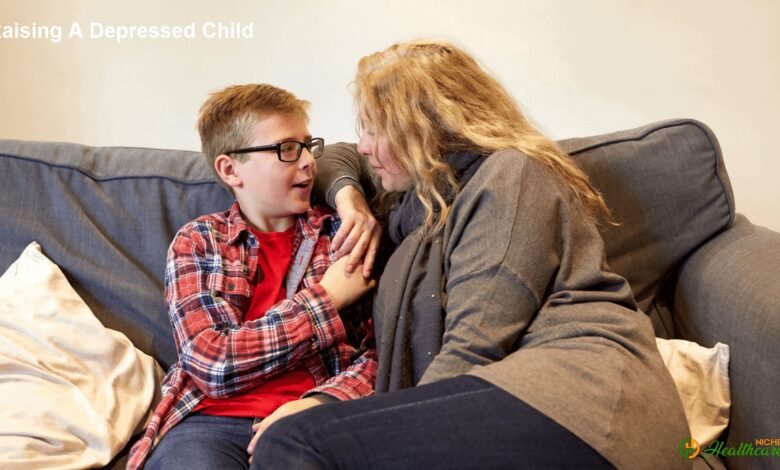How Do I Raise My Depressed Kid?

How to raise a depressed child? For most parents, disciplining a child is a regular worry. Regardless of how serious or minor the offense appears to be, they are concerned about how they can handle it properly. But what can a parent do if their child is despondent or thinking about harming themselves? Is it advisable—or even effective—to maintain discipline at these times?
Dr. Kelsey Bradshaw, a clinical psychologist with a hospital’s Child and Adolescent Inpatient Program, responds to the most frequent inquiries from parents regarding discipline.
Discipline – What Is it?
Many people might assume that disciplining kids entails demanding compliance or applying punishment. Examining your expectations as a parent and how you enforce them for your child is a more beneficial way to think about punishment. When we view punishment as demanding faultless obedience from our child, this can create a difficult standard and lead to more friction between the parent and child.
Read More: Can CBD Help Treat Depression and Anxiety?
What Is A Good Method Of Child Discipline?
We normally advise parents to define some key expectations with their children and then to keep modifying those expectations in light of their child’s growth and temperament. This aids in laying the groundwork for regular expectations that can be modeled and reinforced through acknowledgment, adulation, and the utilization of exceptions.
How Do I Discipline My Child If They Are Depressed Or Thinking About Harming Themselves?
It’s critical to comprehend your child’s temperament and environment. You want to find the right balance between being compassionate and having expectations. Sometimes you have to think about whether your youngster can handle the demands of the moment. However, by setting no expectations or providing excessive care for your child, you don’t want to risk encouraging possibly hazardous behaviors.
What Are Some Symptoms That My Child Might Be Depressed Or Thinking About Committing Suicide?
Depressive symptoms include:
- Decreased time spent with friends and family or engaging in their favorite activities
- Significantly lower academic performance
- Absence from school or adamant opposition to attending
- Significant memory, attention, or focus issues
- Alterations in energy levels, food habits, or sleeping schedules
- Recurring bodily complaints such as headaches, backaches, or stomachaches
- Expressed despair or sobbed frequently
- Frequent violence, disobedience, or vocal outbursts
- Excessive disregard for hygiene or appearance
- I don’t want to be here anymore or I want to die are examples of such statements
How Can I Help My Child When They’re Depressed Or Contemplating Suicide?
Before engaging with others, it’s critical to take stock of your feelings. To regulate your emotions, it might also be beneficial to seek out support from others. Additional recommendations are:
- Try to keep your cool. Never yell at your child, speak too quickly, or threaten them
- Speak deliberately, with assurance, and in a kind, considerate voice
- Even if what your child is saying appears irrational or absurd to you, you shouldn’t dispute with them or challenge them
- Empathize, actively listen, and make an effort to provide encouragement and confidence. But refrain from addressing problems right away or using toxic positivism
- Simple inquiries should be asked, and if necessary, repeated
- Say something like, “I’m here, I care, and I want to help,” in a sincere manner. How may I assist you?
- Make an effort not to personalize your child’s behavior or remarks
- Never face a crisis alone; instead, turn to your support network
- Stay with your child if you have fears that they may be thinking about suicide, but try not to impede their mobility.
Read More: 6 Healthy Habits to Improve Your Mental Health
What Services Are Available To Aid My Sad Kid?
Consider investigating local or online counseling and medicine programs. Make a phone call to your insurance company or conduct some online research using keywords like “therapy,” “depression,” and other variations of these words.
Consider taking part in family counseling, if appropriate. You can ask the school of your child for assistance as well.
Always keep in mind that helping yourself is just as vital as helping your child when they face difficulties. The analogy of putting on your oxygen mask first when traveling with your child should help you remember what to do in case of an emergency. If we want to be able to assist individuals we care about, we must be doing okay for ourselves.







